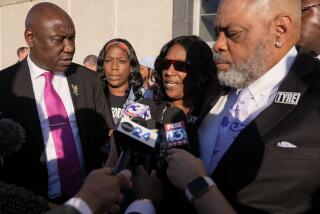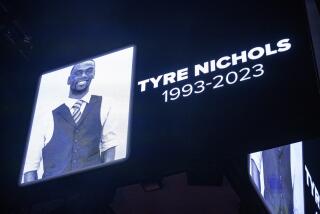Nichols Guilty in Oklahoma Trial
McALESTER, Okla. — A jury convicted Terry L. Nichols of 161 state murder counts Wednesday, rejecting defense claims that he had been an unwitting accomplice to the 1995 Oklahoma City bombing.
The jury, which deliberated just five hours, instead branded him a full partner of executed bomber Timothy J. McVeigh. Next week, prosecutors will try to persuade the same 12 jurors to do what a federal jury would not six years ago: Sentence Nichols to death.
As District Judge Steven Taylor announced the decision, Nichols, 49, looked wan but remained stone-faced. Emotion surged through the courtroom. Doris Delman, 71, pulled out a worn wallet and flipped to a photo of her daughter, Terry Rees, who had died on the seventh floor of the Alfred P. Murrah Federal Building. As her eyes filled with tears, she placed the picture on her lap and patted it gently.
After spilling out of the courthouse, relatives of the victims noted that legally, the verdict marked the first time that anyone had been held accountable for the bulk of the deaths that occurred that morning in 1995.
Nichols and McVeigh were convicted in federal court for the deaths of eight law enforcement officials. McVeigh was put to death in 2001, before he could be brought to trial in state court. Years of delays and legal wrangling had kept Nichols from being tried in the remaining 161 deaths, including that of a fetus of one of the victims.
“It was long, long overdue,” Gloria Taylor said Wednesday. Her daughter, Theresa Lauderdale, 41, died in the explosion. Taylor said she and her husband, John, were making plans to visit their daughter’s grave in Shawnee, Okla. “The main thing was to have peace,” she said. “I think we have that now.”
Nichols’ 1997 federal conviction had brought a life prison term without the possibility of parole. The state trial was moved to McAlester, 130 miles southeast of Oklahoma City, in an effort to ensure an impartial jury. Residents across the state were divided in recent months over whether a second trial would be worth the expense and heartache.
Oklahoma City Mayor Mick Cornett was among those conflicted over the decision to try Nichols again. But in an interview after the jury returned its verdict, Cornett said there was satisfaction in knowing that someone finally had been held accountable for all the deaths.
“There is a lot of solidarity in Oklahoma City. Once people decided [to go to trial], it was an all-for-one effort,” Cornett said. “And if he is guilty of first-degree murder -- on 161 counts -- then, yes, he deserves to die for that crime.”
Many of the victims’ family members agreed Wednesday.
“I don’t think he ought to have the privilege of visiting his daughter and mother,” John Taylor said. “I don’t have that privilege with my daughter. If he doesn’t get the death penalty, then what’s all of this for?”
Delman, still clutching the photo of her daughter, said she could not imagine the jury returning with any other sentence than death.
“I didn’t support the death penalty before this happened,” she said. “But after hearing about how people died, their heads and arms blown off, babies and children dying like they did, what else can you want for someone who would do something like that?”
That opinion, however, is not universal here.
“He’ll be in prison for life. What’s the point?” asked Carrie Reed, 40, who operates a Western apparel store in McAlester with her sister. “He’s never admitted doing it. And he never will. Where’s the satisfaction in that? The whole thing is just really sad.”
Nichols’ attorneys almost certainly would appeal a death sentence. And many legal observers said they would have a good chance of winning. That’s largely because a U.S. district judge, in moving the federal trials of Nichols and McVeigh to Denver, had ruled that “there is so great a prejudice against these two defendants ... that they cannot obtain a fair and impartial trial at any place ... in the state.”
“Regardless of the outcome, this was a ... terrible waste of public resources,” said Michael E. Tigar, who represented Nichols during the federal trial. “The people of Oklahoma suffered in that tragedy. It was unfair to ask them to then take on the burden of trying to be fair judges of what happened.”
Prosecutors and defense attorneys in the current trial -- a complex case that took two months to present and brought 250 people to the witness stand -- are prohibited from speaking publicly until the jury renders its sentence.
Nichols’ attorneys contended during the trial that he was a scapegoat, unaware of the scope of the attack, and that he had been set up by McVeigh to take the fall.
Nichols was believed to have been at home in Kansas the day of the bombing. There were no witnesses identifying him as the person who purchased the fertilizer used in the Ryder truck bomb, as prosecutors alleged. And there was scant evidence to support prosecutors’ charges that Nichols had helped break into a rock quarry to steal the detonation cord used in the blast.
“They’re not searching for the truth,” defense attorney Brian Hermanson told the jury during his closing argument Tuesday. “They’re trying to make a case.”
But prosecutors argued that Nichols was a full and willing partner in the attack, which allegedly was staged to avenge the 1993 raid on the Branch Davidian compound near Waco, Texas. For seven months, they argued, Nichols worked to acquire the bomb components and then met McVeigh at a park in Junction City, Kan., to assemble the device.
Given what they called a tidal wave of evidence, many officials involved in prosecuting Nichols and McVeigh said they hoped Wednesday’s conviction would put to rest the doubts that continued to surround the case.
Numerous witnesses, for instance, have claimed they saw a man who was not Nichols with McVeigh in the weeks before the bombing. Nichols’ defense lawyers tried -- and failed -- to introduce evidence alleging that members of a white supremacist gang, not Nichols, had helped McVeigh carry out the bombing.
“There are people who are interested in conspiracy theories and pursue them ... but there is no evidence that there was anyone else involved,” said Beth Wilkinson, who as a U.S. attorney played a leading role in the federal prosecution of Nichols and McVeigh. Wilkinson is now an attorney in Washington, D.C.
“The cumulative effect of the evidence is what is most persuasive,” Wilkinson said. “There is overwhelming evidence of Terry Nichols’ guilt.”
Hart reported from McAlester and Gold from Houston.
More to Read
Sign up for Essential California
The most important California stories and recommendations in your inbox every morning.
You may occasionally receive promotional content from the Los Angeles Times.










